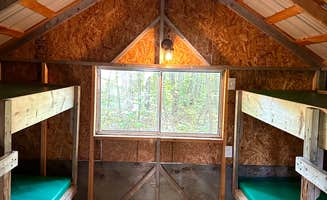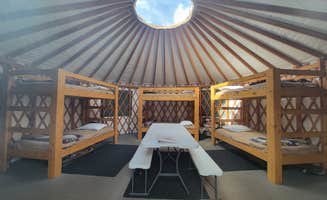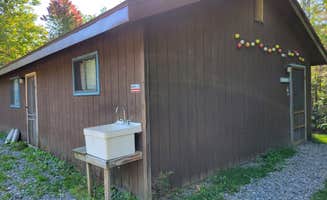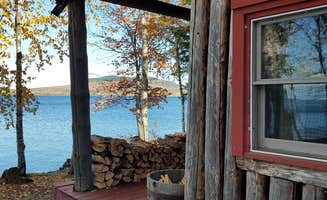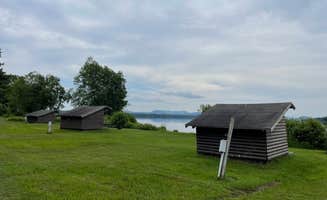The Maine woods surrounding West Forks offer remote camping experiences with elevations ranging from 600-1,200 feet above sea level. Situated at the confluence of the Dead and Kennebec Rivers, this region experiences warm summers with daytime temperatures typically reaching 75-85°F from June through August. Seasonal yurt camping near West Forks provides an alternative to traditional tent sites with many locations remaining accessible through mid-October before winter conditions arrive.
What to do
Whitewater adventures: The Kennebec and Dead Rivers provide Class III-V rapids for rafting enthusiasts. Magic Falls Adventures Campground serves as a convenient base camp for water expeditions. "We really enjoyed staying here since we were rafting with them the next day. Cheap spots right next to the river," notes Catherine M., who appreciated the proximity to their rafting expedition.
Paddling calm waters: Explore Moosehead Lake's 75,000 acres of freshwater or smaller ponds in the region. Cathedral Pines Campground offers boat rentals and direct lake access. "There is a public beach, opportunities for canoeing and kayaking Flagstaff lake with rentals available if you didn't bring your own," explains Jean C., who used the campground for both water activities and hiking.
Wildlife viewing: Early morning and dusk offer prime moose-watching opportunities. The Birches Resort provides access to prime wildlife viewing areas. "We saw loons and bald eagles on the lake daily," reports one visitor who stayed at a lakefront site after Labor Day when wildlife activity increases.
What campers like
Spacious sites: Many campgrounds provide generous spacing between campsites for privacy. "Sites are very large and spacious. You are not on top of the next one," writes Ken B. about Cathedral Pines Campground, where individual fire boxes with cooking grates are standard at each site.
Lake views: Waterfront camping offers direct views of sunrises and mountain vistas. "Waterfront sites have gorgeous views. We saw loons and bald eagles on the lake daily," notes Jillian at Moosehead Family Campground. Their sites provide excellent vantage points for photography and wildlife observation.
Comfortable yurt options: Insulated yurts provide a comfortable glamping experience for those wanting amenities beyond tent camping. These structures come in various configurations with practical features for extended stays. "Our site was a long pull thru that sloped down in the front and took a bit for us to get level," explains Nancy W., who stayed at a site offering more space than standard tent pads.
What you should know
Road conditions: Access to remote sites often requires navigating unpaved logging roads. "It's a long, bumpy, and dusty road to basically an 18-site parking lot," reports Meghan B. about Cowan Cove, noting that despite limited amenities, it offers excellent kayaking opportunities.
Seasonal limitations: Most campgrounds operate from mid-May through September or mid-October. Some yurt accommodations remain open longer, depending on road access. "Considering the wilderness location, the facilities are great," writes WhiteSpruce D., who visited Seboomook during the prime summer season.
Bathroom facilities: Bathroom quality varies significantly between locations. "The bathhouse is pretty far away from the camping area which is inconvenient when you have to go to the bathroom in the middle of the night," notes one visitor about the layout at a wilderness campground, highlighting the importance of bringing a flashlight.
Tips for camping with families
Protected swimming areas: Several campgrounds maintain dedicated swimming areas with gradual entry points for children. "The water is very shallow and the depth increases very slowly. We could walk about 100 feet before the water was chest high. This would be perfect for kids!" explains Scott M. about Seboomook Wilderness Campground, where sandy beaches are attached to many waterfront sites.
Playgrounds and activities: Family-oriented campgrounds offer organized activities during peak season. "Great place to bring kids. The staff here were friendly and very helpful for any questions or camping needs you had," writes Will T. about Yogi Bear's Jellystone Park at Yonder Hill, which features themed weekends throughout the season.
Educational opportunities: Wildlife viewing trips can provide learning experiences for children. "Perfect basecamp for outdoor adventures. Sites are very large. Facilities are very clean and cleaned daily," notes Jillian about Cathedral Pines, emphasizing its dual appeal for families seeking both education and recreation.
Tips from RVers
Site leveling challenges: Many remote campgrounds have natural, uneven terrain requiring leveling blocks. "Our site was a long pull thru that sloped down in the front and took a bit for us to get level and our front steps were pretty high off the ground," shares Nancy W. about one campground, recommending extra leveling equipment.
Limited hookups: Most campgrounds offer water and electric but fewer provide sewer connections. "There was water but no sewer however the dump station was easy to access and never very busy since the campground is so small," reports a reviewer who appreciated the well-maintained facilities despite limited hookups.
Generator hours: Some wilderness campgrounds operate generators only during specific hours. "We only have electric when the generators run that power the campground. It worked out fine for us," explains B.M. who stayed at Seboomook Wilderness Campground, where timed power availability didn't detract from their experience.


